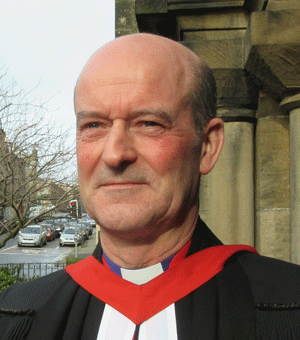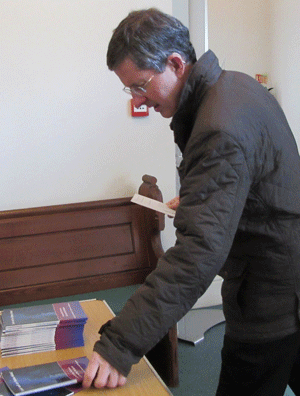Launch of ‘Look Well on these Skies’
 March 6, 2016, was an exciting morning at Mayfield Salisbury, because at our morning services we launched the book produced by members of the congregation: ‘Look well on these Skies’ and every worshipper was encouraged to take a copy away with them to read and enjoy and also to take extra copies to pass around.
March 6, 2016, was an exciting morning at Mayfield Salisbury, because at our morning services we launched the book produced by members of the congregation: ‘Look well on these Skies’ and every worshipper was encouraged to take a copy away with them to read and enjoy and also to take extra copies to pass around.The tone of the services was set by the words of Francis Collins, Director of the Human Genome Project & Director of the National Institutes of Health, USA, which were quoted on the front of the Orders of Service. ‘The God of the Bible is also the God of the Genome. He can be worshipped in the cathedral or the laboratory. His creation is majestic, awesome, intricate and beautiful – and it cannot be at war with itself…It is time to call a truce between the escalating war between science and spirit – a war initiated by extremists on both sides….science is not threatened by God and God is most certainly not threatened by science; He made it possible.’

The sermon was preached by Revd Professor David Fergusson, Principle of New College, University of Edinburgh, Gifford Lecturer.
Professor Fergusson said, ‘The book is remarkably rich in terms of its content, clarity and range of literary forms. It could not have been written by one person, and it shows the benefits of teamwork, cross-disciplinary collaboration and the editorial hand of those who can communicate effectively with wider audiences. Like the gospels, it also has the merit of being short and very manageable. So you can dip in and out of it, and return to it with profit. Its technical sections are clear and of course well informed, and these are supplement by poems, reading and reflections. I trust that it will be widely used by individuals and groups.’
 He also stressed how science and faith ask different questions. ‘They offer different answers and have contrasting approaches. Why is there a universe at all? Is there a purpose to my being here? Why are loving God and my neighbour the two most important commandments? These are not scientific questions that can be dealt with by theory and experimentation. The ‘why’ questions are of another order and produce different forms of understanding. Science for its part has made spectacular progress in the last four centuries with the how questions – how does the universe work, how do human being come to be here, how do our bodies function.’
He also stressed how science and faith ask different questions. ‘They offer different answers and have contrasting approaches. Why is there a universe at all? Is there a purpose to my being here? Why are loving God and my neighbour the two most important commandments? These are not scientific questions that can be dealt with by theory and experimentation. The ‘why’ questions are of another order and produce different forms of understanding. Science for its part has made spectacular progress in the last four centuries with the how questions – how does the universe work, how do human being come to be here, how do our bodies function.’  Later he mentioned Jonathan Sacks, the former Chief Rabbi, who was awarded the Templeton Prize for Progress in Religion last week, and has written of what he calls the great partnership between science and religion, saying ‘Science takes things apart to see how they work. Religion puts things together to see what they mean.'
Later he mentioned Jonathan Sacks, the former Chief Rabbi, who was awarded the Templeton Prize for Progress in Religion last week, and has written of what he calls the great partnership between science and religion, saying ‘Science takes things apart to see how they work. Religion puts things together to see what they mean.' 
Professor Fergusson’s sermon is available in audio, video and text here.
The editor in chief of the book, Douglas Blackwood, summarized what the book is about in our parish magazine, ‘With contributions from very many members of our congregation, this booklet, through prose, poetry and illustrations, is a response to claims that religious beliefs have been overtaken by the amazing progress of science. Creation in Scripture, the
 Big Bang, evolution, DNA and consciousness are all discussed. Other topics include how we keep the Bible at the heart of a scientific world view; suffering in an evolutionary world; and ways in which faith illuminates the science of climate change, organ transplantation and genetic modification.’
Big Bang, evolution, DNA and consciousness are all discussed. Other topics include how we keep the Bible at the heart of a scientific world view; suffering in an evolutionary world; and ways in which faith illuminates the science of climate change, organ transplantation and genetic modification.’This is further explained in the introduction to the book itself, which states: “It is fair to ask ‘Why another booklet on science and religion?’ when the topic is already so thoroughly
 addressed by eminent theologians and scientists. The idea for this booklet emerged when members of Mayfield Salisbury Parish Church, with backgrounds in teaching and research across a range of scientific fields, decided to respond to the ‘Scientists in Congregations’ initiative of the Templeton Foundation. In our largely secular culture, there is a deeply ingrained viewpoint that religious beliefs and practices are products of an earlier, less enlightened age that has been convincingly overtaken by science. The Scientists in Congregations project is timely in its aim of ‘seeking to encourage conversation about faith and science within congregations across Scotland’. The experience of each one of us has been that science sustains and deepens our Christian faith, contrary to the widely held perception of a head-on collision between science and the Bible.”
addressed by eminent theologians and scientists. The idea for this booklet emerged when members of Mayfield Salisbury Parish Church, with backgrounds in teaching and research across a range of scientific fields, decided to respond to the ‘Scientists in Congregations’ initiative of the Templeton Foundation. In our largely secular culture, there is a deeply ingrained viewpoint that religious beliefs and practices are products of an earlier, less enlightened age that has been convincingly overtaken by science. The Scientists in Congregations project is timely in its aim of ‘seeking to encourage conversation about faith and science within congregations across Scotland’. The experience of each one of us has been that science sustains and deepens our Christian faith, contrary to the widely held perception of a head-on collision between science and the Bible.”  The books are free of charge thanks to generous funding from the Templeton Foundation through ‘Scientists in Congregations Scotland’. They are available from Mayfield Salisbury Parish Church. Requests for hard copies should be made to
The books are free of charge thanks to generous funding from the Templeton Foundation through ‘Scientists in Congregations Scotland’. They are available from Mayfield Salisbury Parish Church. Requests for hard copies should be made to 